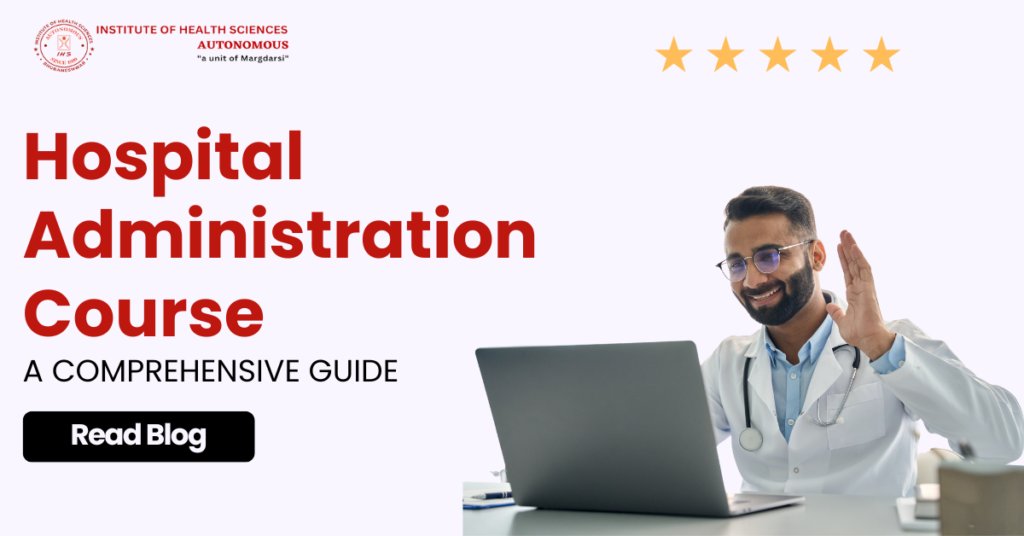Introduction: The Vital Role of Hospital Administration in Healthcare
In the complex realm of healthcare, the efficient and effective functioning of medical facilities hinges on a well-structured and adept administration.
Hospital administration, often referred to as healthcare management, is the backbone that supports the seamless delivery of patient care, operational management, and resource allocation within healthcare institutions.
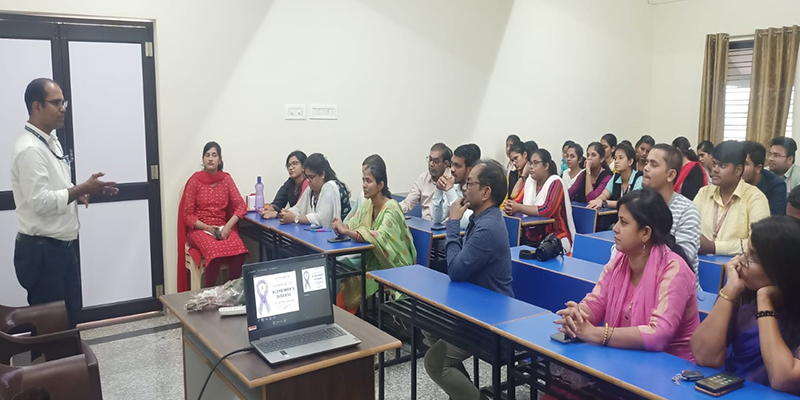
It’s the strategic orchestration of people, resources, and processes that ensures the entire healthcare system operates like a well-oiled machine.
As the healthcare landscape continues to evolve, the demand for skilled professionals in hospital administration has seen a remarkable upswing.
The modern healthcare industry is characterized by advancements in medical technology, evolving patient expectations, and intricate regulatory requirements.
This dynamic environment requires adept administrators who possess a unique blend of leadership acumen, business proficiency, and a deep understanding of healthcare nuances.
The growing demand for these skilled professionals is a direct result of the pivotal role they play in bridging the gap between medical expertise and operational excellence.

Hospital administrators are the linchpin that connects clinical practitioners, management teams, and the community at large.
They contribute to optimizing resource utilization, enhancing patient experiences, and fostering an environment that enables healthcare practitioners to focus on what they do best: providing quality patient care.
The significance of hospital administration extends beyond the confines of administrative tasks; it directly impacts patient outcomes, financial stability, and the overall reputation of healthcare institutions.
As the healthcare sector continues to expand and diversify, the need for competent hospital administrators has become more pronounced than ever before.
In this pursuit, hospital administration courses emerge as a vital pathway for individuals looking to enter this dynamic field and make a meaningful impact on the healthcare industry.
These hospital administration course in India not only equip aspiring professionals with the necessary skills but also position them at the forefront of a rewarding and impactful career.
Defining Hospital Administration and its Crucial Role

Hospital administration, also known as healthcare management, is the discipline that oversees the strategic planning, coordination, and execution of administrative tasks within healthcare facilities.
This encompasses a wide spectrum of responsibilities that extend beyond medical care to ensure the smooth operation of hospitals, clinics, and healthcare organizations.
Enroll in the Master of Hospital Administration program today!
The Role of Hospital Administrators in Healthcare Settings

- ✅ Leadership and Direction: In the realm of healthcare, effective leadership through a Hospital Administration Course is paramount. Hospital administrators serve as the guiding force that steers the institution toward its goals and objectives. They provide vision, set organizational priorities, and establish strategies to enhance patient care delivery and operational efficiency.
- ✅ Resource Management: Hospital administrators trained in a comprehensive Hospital Administration Course excel in effective allocation of resources, including financial, human, and technological assets. This pivotal skill ensures that resources are optimally used to maintain high-quality patient care and sustain the institution’s growth.
- ✅ Regulatory Compliance: Hospitals today operate within a stringent regulatory environment that demands expertise. Administrators, armed with insights from a Hospital Administration Course, ensure that the facility complies with all legal and regulatory standards. This includes licensing, accreditation, and adherence to evolving healthcare laws.
- ✅ Financial Stewardship: The intricacies of financial management in healthcare are mastered through a Hospital Administration Course. Hospital administrators manage budgets, financial planning, and revenue generation with finesse. They balance the need for cost-effective operations with maintaining the highest standards of patient care.
- ✅ Personnel Management: Human resources are the lifeblood of healthcare institutions, a fact emphasized in a Hospital Administration Course. Administrators, equipped with training, oversee staffing, recruitment, training, and employee relations. Their skills ensure a motivated and skilled workforce that contributes to operational excellence.
- ✅ Patient Experience: Hospital administrators’ focus on patient satisfaction is heightened through specialized training like a Hospital Administration Course. This includes ensuring timely and compassionate care, managing wait times, and fostering a patient-centered environment that enhances the overall patient experience.
- ✅ Strategic Partnerships: Collaborations in healthcare are pivotal, and administrators versed in a Hospital Administration Course excel in fostering strategic partnerships. These collaborations extend to medical professionals, vendors, and community stakeholders, promoting a holistic approach to healthcare delivery.
- ✅ Rapid Technological Changes: In a world of rapid technological evolution, administrators prepared by a Hospital Administration Course adeptly incorporate electronic health records, telemedicine, and data-driven decision-making into healthcare operations.
- ✅ Rising Healthcare Costs: Administrators who’ve completed a Hospital Administration Course strike the balance between quality care and cost-efficiency. They employ strategies to provide exceptional care without inflating healthcare expenses.
- ✅ Changing Regulatory Environment: The dynamic regulatory landscape is navigated with precision by administrators who’ve undergone a Hospital Administration Course. They remain up-to-date with evolving regulations, ensuring compliance and safeguarding against legal issues.
- ✅ Patient Expectations: Meeting and exceeding patient expectations is a hallmark of administrators trained in a Hospital Administration Course. They skillfully manage resources to provide personalized, convenient, and high-quality care that aligns with patient needs.
- ✅ Workforce Management: A positive work environment and skilled workforce are nurtured by administrators who’ve honed their skills through a Hospital Administration Course. Recruiting and retaining top medical talent becomes a reality under their leadership.
In essence, hospital administrators who’ve undergone a comprehensive Hospital Administration Course serve as pivotal architects of healthcare excellence.
Their multifaceted role not only impacts daily healthcare operations but also directly influences the overall health and well-being of patients and communities they serve.
Through strategic leadership, resource optimization, and patient-centered care, these administrators shape the future of healthcare institutions.
Read More: Reasons To Choose Institute of Health Sciences, Bhubaneswar 11 Top (& Honest)
Purpose of Hospital Administration Courses: Nurturing Healthcare Leaders

Hospital administration courses are designed to equip aspiring professionals with the knowledge, skills, and expertise required to excel in the dynamic field of healthcare management.
These Hospital administration courses serve as a comprehensive training ground that prepares individuals to navigate the complex landscape of healthcare operations, administration, and leadership.
The ultimate goal is to produce competent and visionary administrators who can seamlessly balance the demands of quality patient care with efficient resource management.
Curriculum and Core Subjects Covered in Hospital Administration Courses:
- Healthcare Management Principles: This foundational subject delves into the fundamental principles of managing healthcare organizations. Topics include organizational behavior, strategic planning, and leadership dynamics.
- Financial Management in Healthcare: Understanding healthcare finances is pivotal. This subject covers budgeting, financial analysis, revenue cycle management, and cost control strategies specific to healthcare settings.
- Healthcare Law and Ethics: The legal and ethical dimensions of healthcare are explored, addressing issues such as medical ethics, patient rights, medical malpractice, and compliance with regulations.
- Healthcare Information Systems: In the digital age, administrators must grasp information technology’s role in healthcare. This subject covers electronic health records, health information systems, and data security.
- Healthcare Quality Improvement: Quality and patient safety are paramount. This subject explores methods to enhance healthcare quality, risk management, and continuous improvement initiatives.
- Human Resources in Healthcare: Personnel management within healthcare organizations is emphasized, including recruitment, training, employee relations, and workforce optimization.
- Healthcare Marketing and Public Relations: Administrators need to promote their healthcare services effectively. This subject covers marketing strategies, public relations, and building positive patient relations.
- Healthcare Policy and Regulations: The intricate healthcare policy landscape is explored, including government regulations, health insurance, and the impact of policy changes on healthcare organizations.
- Healthcare Operations Management: Efficiency in healthcare operations is critical. This subject covers logistics, supply chain management, and optimizing patient flow.
- Healthcare Leadership and Communication: Effective leadership and communication skills are emphasized. Students learn how to manage teams, resolve conflicts, and communicate within a healthcare setting.
- Healthcare Strategic Planning: Administrators must envision the future of healthcare organizations. This subject covers strategic planning, market analysis, and adapting to industry trends.
Hospital administration courses amalgamate these subjects to provide a holistic understanding of healthcare management.
The curriculum is carefully crafted to nurture well-rounded professionals who can effectively lead, manage, and innovate within healthcare institutions.
Graduates emerge equipped to tackle the multifaceted challenges of healthcare administration and contribute to enhancing patient care, operational efficiency, and overall healthcare quality.
Are You Still Wasting Money on NEET Preparation in 2023? Here’s a Solution
Secure your spot now for the MHA program at ihs.ac.in/register-online.
Essential Skills Acquired in Hospital Administration Courses: Building Competent Healthcare Leaders

Hospital administration courses go beyond theoretical knowledge; they focus on equipping students with a diverse skill set that prepares them to excel in the intricate realm of healthcare management.
These courses nurture professionals who can adeptly navigate the challenges of the healthcare landscape while ensuring quality patient care and operational excellence. Here are some of the crucial skills students acquire:
- Financial Management: Mastery of financial concepts specific to healthcare, including budgeting, cost analysis, revenue cycle management, and financial planning.
- Leadership and Team Management: Cultivation of effective leadership qualities to inspire and guide teams, resolve conflicts, and foster a positive work culture.
- Communication Proficiency: The ability to communicate clearly, concisely, and empathetically with diverse stakeholders, including medical staff, patients, and administrative personnel.
- Strategic Planning: Skill in devising long-term strategies that align with healthcare goals, taking into account market trends, patient needs, and operational efficiency.
- Healthcare Quality Improvement: Expertise in implementing strategies to enhance healthcare quality, patient safety, and continuous improvement initiatives.
- Problem Solving and Decision Making: Aptitude for analyzing complex situations, making informed decisions, and implementing effective solutions to challenges within healthcare settings.
- Ethical Decision-Making: Understanding of ethical principles in healthcare, enabling administrators to navigate morally complex situations while upholding patient welfare.
- Healthcare Policy and Regulations: Knowledge of healthcare laws, regulations, and compliance requirements to ensure adherence and mitigate legal risks.
- Interdisciplinary Collaboration: Proficiency in collaborating with medical professionals, support staff, and stakeholders to ensure comprehensive and patient-centered care.
- Crisis Management: Preparedness to manage crises, from unforeseen medical emergencies to public health challenges, while ensuring minimal disruption to operations.
- Technology Integration: Familiarity with healthcare information systems, electronic health records, and digital tools to streamline operations and improve patient care.
- Time Management and Prioritization: Skill in effectively managing tasks, deadlines, and responsibilities in a fast-paced healthcare environment.
- Adaptability and Resilience: The ability to adapt to changes, challenges, and uncertainties, while maintaining a resilient and positive outlook.
- Data-Driven Decision Making: Capability to utilize data and analytics to make informed decisions that optimize patient outcomes and operational efficiency.
- Customer Service Excellence: A commitment to delivering exceptional patient experiences through attentive service and patient-focused interactions.
Hospital administration courses foster these skills, empowering students to become well-rounded healthcare leaders who can confidently manage the intricate web of healthcare operations, administration, and patient care.
These skills are pivotal for administrators to lead with integrity, drive innovation, and elevate the overall quality of healthcare delivery.
Read More: Speech And Hearing Course Fees
Diverse Career Avenues for Graduates of Hospital Administration Courses

Completing a hospital administration course opens a door to a vast array of fulfilling and impactful career opportunities within the healthcare industry.
Graduates are equipped with a unique skill set that enables them to excel in various roles that play a pivotal role in healthcare administration, patient care, and operational efficiency.
Here are some of the exciting career paths that await them:
- Hospital Administrator: As a hospital administrator, you will be at the helm of healthcare institutions, overseeing day-to-day operations, strategic planning, and resource allocation. You’ll collaborate with medical professionals, manage budgets, and ensure the facility runs seamlessly.
- Healthcare Manager: Healthcare managers lead specific departments or units within a healthcare organization. This could include managing a clinical department, patient services, human resources, or information technology.
- Medical Office Manager: In medical practices, clinics, or outpatient facilities, medical office managers handle administrative tasks, financial management, patient scheduling, and staff coordination, ensuring the smooth functioning of the facility.
- Healthcare Consultant: Healthcare consultants provide expertise to healthcare organizations seeking guidance on improving operations, enhancing patient experiences, and optimizing resource utilization.
- Healthcare Policy Analyst: In this role, you’ll analyze healthcare policies, regulations, and industry trends. You’ll provide insights to organizations and policymakers to make informed decisions that impact patient care and healthcare systems.
- Healthcare Project Manager: Project managers oversee and coordinate healthcare projects, such as implementing new systems, technology upgrades, or facility expansions, ensuring projects are executed on time and within budget.
- Health Information Manager: Health information managers ensure accurate maintenance of patient records, adherence to privacy regulations, and efficient management of healthcare data.
- Nursing Home Administrator: Nursing home administrators oversee residential care facilities, managing operations, staffing, and ensuring quality care for elderly residents.
- Healthcare Risk Manager: Risk managers assess potential risks within healthcare organizations and develop strategies to mitigate them, ensuring patient safety and minimizing liability.
- Healthcare Quality Improvement Coordinator: Professionals in this role focus on enhancing healthcare quality by analyzing data, implementing improvement initiatives, and ensuring compliance with quality standards.
- Clinic Manager: Clinic managers oversee the day-to-day operations of medical clinics, ensuring efficient patient flow, staff coordination, and high-quality care delivery.
- Healthcare Compliance Officer: Compliance officers ensure that healthcare organizations adhere to legal and regulatory requirements, promoting ethical practices and minimizing legal risks.
- Healthcare Facility Manager: Facility managers ensure the physical infrastructure of healthcare facilities is well-maintained, safe, and conducive to optimal patient care.
- Healthcare Entrepreneur: Graduates can leverage their skills to start their own healthcare ventures, such as healthcare consulting firms, medical billing companies, or healthcare technology startups.
- Healthcare Educator: Educators with a background in hospital administration can teach and mentor future generations of healthcare administrators and managers.
The diverse range of roles demonstrates the breadth of opportunities available to graduates of hospital administration courses.
Each role contributes to the broader goal of enhancing patient care, improving operational efficiency, and driving positive changes within the healthcare industry.
10 Lucrative Audiology Jobs To Watch Out For In 2023 & Beyond
Don’t miss out! Join the MHA program and shape your medical career.
The Crucial Role of Hospital Administrators in Enhancing Healthcare Excellence
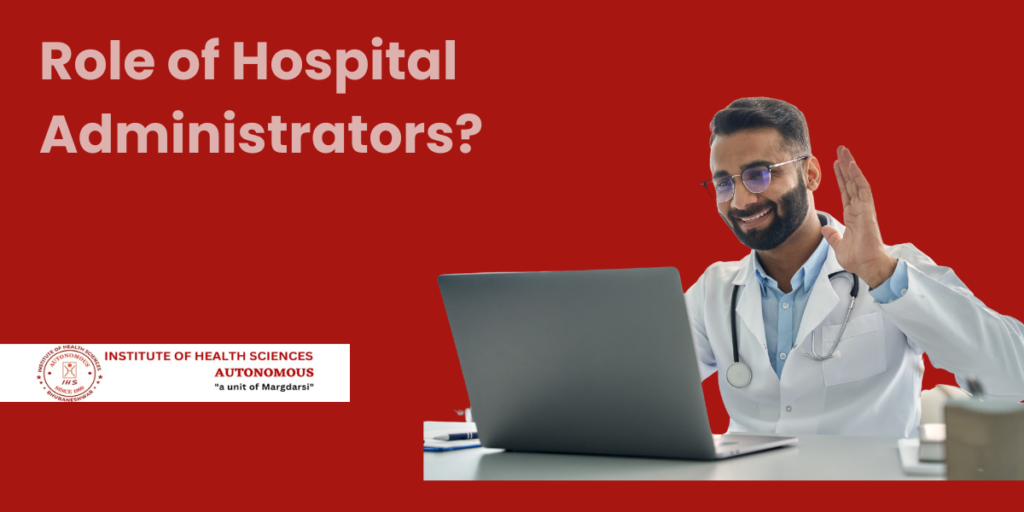
Hospital administrators are the unsung heroes working behind the scenes, orchestrating the symphony of healthcare operations to ensure a harmonious blend of quality patient care, seamless operations, and overall organizational effectiveness.
Their role extends far beyond administrative tasks; they are the architects of a healthcare institution’s success, playing a pivotal role in shaping its identity, reputation, and impact on the community.
✅ Ensuring Smooth Operations: Hospital administrators serve as the linchpin that holds together the intricate web of healthcare operations. They optimize resource allocation, streamline workflows, and coordinate diverse departments to guarantee the facility runs like a well-oiled machine. From managing staffing levels to ensuring the availability of medical supplies, administrators are the unseen force that ensures every cog in the healthcare machinery is aligned and functioning optimally.
✅ Championing Quality Patient Care: The heart of healthcare administration lies in its dedication to providing quality patient care. Administrators create an environment that prioritizes patient safety, comfort, and well-being. They implement protocols and guidelines that ensure healthcare practitioners deliver evidence-based care, adhere to ethical standards, and follow best practices. This commitment to quality care extends from the operating room to the front desk, encompassing every aspect of the patient journey.
✅ Strategic Decision-Making for Excellence: Hospital administrators are entrusted with strategic decision-making that shapes the trajectory of healthcare institutions. From expanding service offerings to adopting new technologies, administrators anticipate industry trends and implement initiatives that enhance patient experiences and elevate clinical outcomes. Their foresight and strategic planning influence the institution’s growth, adaptability, and resilience in a rapidly evolving healthcare landscape.
✅ Optimizing Efficiency and Effectiveness: The impact of hospital administrators on healthcare institutions’ efficiency and effectiveness is profound. Through data-driven analysis, they identify bottlenecks, streamline processes, and implement improvements that maximize resource utilization. Whether it’s reducing patient wait times, optimizing bed utilization, or implementing cost-saving measures, administrators drive efficiency to ensure that healthcare services are delivered promptly and resourcefully.
✅ Building Collaborative Networks: Administrators foster collaborative relationships within the healthcare ecosystem. They bridge gaps between clinical teams, support staff, patients, and external stakeholders. By nurturing these networks, administrators create an environment of open communication, teamwork, and shared goals, ultimately benefiting patient care and organizational success.
✅ Innovating for Excellence: Administrators champion innovation within healthcare institutions. They leverage technological advancements, explore best practices, and adopt new models of care delivery to stay at the forefront of healthcare excellence. Their innovative initiatives enhance patient outcomes, operational efficiency, and the institution’s competitive edge.
In summation, hospital administrators are the architects of a holistic healthcare experience.
Their leadership, strategic thinking, and commitment to quality patient care are instrumental in shaping healthcare institutions’ identity, reputation, and lasting impact.
Through their diligent efforts, administrators elevate the standard of care, drive operational efficiency, and pave the way for healthcare institutions to thrive in their mission of service to the community.
Read More: Career In Occupational Therapy
Eligibility and Admission Process For Hospital Administration Course
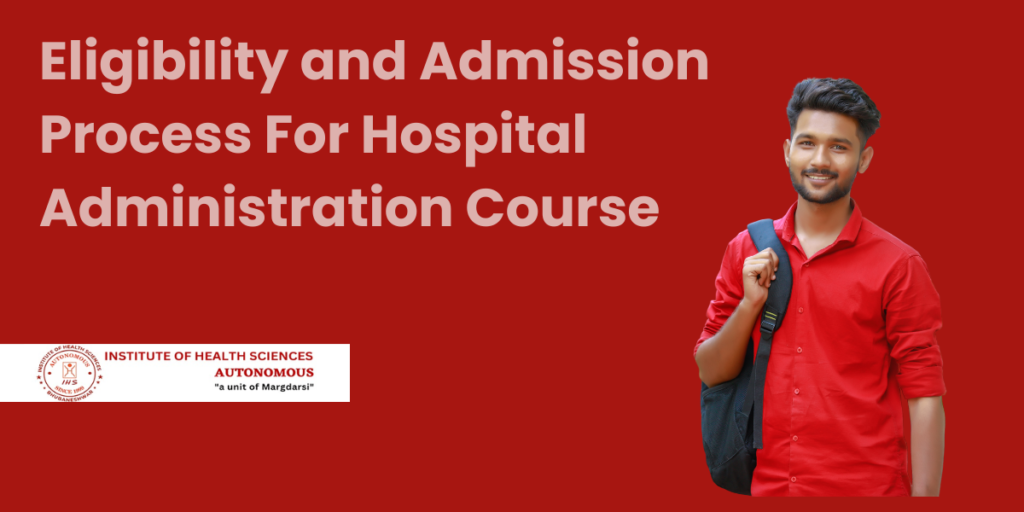
The hospital administration course qualification are:
Eligibility:
- Graduates in any discipline from a recognized university with 50% marks
Admission Process:
- Here’s the step-by-step guide to secure your admission:
Open the website ihs.ac.in.
Navigate to the academic programs section.
Find the Master in Hospital Administration.
Click on “take admission.”
Fill in your name and contact information.
Upload the required certificate file.
Make a payment of hospital administration course fees ₹20,000/- as the admission fee.
Our counselor will review your documents and confirm your admission for the session 2023-24.
For any queries or assistance, feel free to contact our counselor 98273-73644, 89172-96239 or the Course Coordinator 98677 58589.
IHS Affiliation And Recognition For Master in Hospital Administration
- Permanent Affiliation UTKAL UNIVERSITY
- B++ NAAC Accreditation (Quality Education Assured)
- Approved by RCI (Rehabilitation Council of India, New Delhi), a statutory body by Govt. of India
- Recognized by Govt. Of Odisha as REFERRAL HOSPITAL
- It has been associated with OPEPA/OCEPA in their integrated education for the disabled (IED) program
- Government of Odisha for medical officers and Para medical personnel.
- Recognized State Nodal Center of National Trust named Margdarsi,
Read More: Public Health Course
Emerging Trends in Hospital Administration: Shaping the Future of Healthcare
The landscape of hospital administration is undergoing a transformative evolution driven by technological advancements, changing patient expectations, and the increasing importance of data-driven decision-making.
These trends are reshaping the way healthcare institutions are managed and how patient care is delivered. Let’s delve into the key emerging trends in hospital administration:
- Integration of Technology: Technology has become the backbone of modern healthcare administration. From electronic health records (EHR) and telemedicine to robotic process automation (RPA) and artificial intelligence (AI), technology streamlines administrative processes, enhances communication, and improves patient care delivery. Integrating advanced tools improves operational efficiency, reduces errors, and fosters seamless collaboration among healthcare professionals.
- Patient-Centered Care: Patient-centered care has shifted from being a buzzword to a central tenet of hospital administration. Institutions are embracing a holistic approach that revolves around the patient’s preferences, needs, and values. This involves personalized treatment plans, improved communication, and an environment that prioritizes patient comfort and satisfaction. Hospital administrators are key drivers in promoting a patient-centric culture throughout the organization.
- Data-Driven Decision-Making: The availability of vast amounts of healthcare data has led to a paradigm shift in decision-making. Hospital administrators now leverage data analytics to make informed choices regarding resource allocation, patient care protocols, and operational efficiency. By harnessing insights from data, administrators optimize processes, identify trends, and drive evidence-based improvements in patient outcomes.
- Remote Patient Monitoring: Technological advancements have paved the way for remote patient monitoring, allowing administrators to keep a closer watch on patients outside traditional healthcare settings. Wearable devices, IoT-enabled sensors, and telehealth platforms enable real-time tracking of vital signs and health metrics, enhancing patient management and reducing readmissions.
- Value-Based Healthcare: The transition from a fee-for-service model to a value-based care model places greater emphasis on outcomes and patient satisfaction. Hospital administrators work to align their institutions with this approach by focusing on preventive care, care coordination, and optimizing the patient journey to enhance overall wellness and reduce costs.
- Healthcare Blockchain: Blockchain technology is gaining traction in healthcare administration due to its potential to secure patient data, streamline medical record sharing, and ensure data integrity. Administrators are exploring how blockchain can enhance data security, interoperability, and patient privacy.
- Telemedicine Expansion: Telemedicine has surged in popularity, especially in the wake of global health crises. Hospital administrators are leveraging telemedicine to extend healthcare services beyond physical boundaries, ensuring remote access to medical consultations, diagnosis, and treatment.
- Interoperability and Health Information Exchange: Hospital administrators are advocating for improved interoperability between healthcare systems and sharing patient information seamlessly. This enables better care coordination, reduces redundant tests, and ensures comprehensive patient care.
- Sustainability and Environmental Responsibility: Hospital administrators are increasingly considering sustainability in facility design, energy usage, waste management, and procurement decisions. Implementing eco-friendly practices aligns with community expectations and reduces healthcare’s environmental footprint.
- Workforce Development and Well-Being: Recognizing the importance of a motivated and skilled workforce, hospital administrators are focusing on employee well-being, training, and professional development. Ensuring staff satisfaction translates to improved patient care and operational efficiency.
Read More: BASLP Subjects
Navigating Challenges in Hospital Administration: A Comprehensive Course’s Empowering Solution
In today’s dynamic healthcare landscape, hospital administrators encounter an array of challenges that require astute decision-making, adaptability, and a nuanced understanding of healthcare operations.
From rapidly evolving technology to shifting patient expectations, administrators must navigate complex terrain to ensure seamless operations and optimal patient care.
Here, we address these challenges and unveil how a comprehensive hospital administration course empowers students to conquer these obstacles and seize opportunities.
- Technological Advancements and Integration: Hospitals grapple with incorporating ever-evolving technology into their systems while ensuring data security and compliance. Administrators need to choose the right technological solutions that enhance efficiency without disrupting workflows. A comprehensive course equips students with insights into healthcare informatics, data management, and the skills to navigate technological transformations seamlessly.
- Regulatory Compliance and Healthcare Laws: The healthcare landscape is intricately regulated, with legal frameworks frequently evolving. Administrators must stay updated on compliance requirements, patient privacy laws, and healthcare policies to avoid legal risks. A hospital administration course provides in-depth knowledge of healthcare regulations and prepares students to implement protocols that safeguard institutions against legal complications.
- Rising Healthcare Costs and Budget Constraints: Administrators must balance the imperative for cost-effective healthcare with maintaining high-quality patient care. Navigating budget constraints, allocating resources efficiently, and finding innovative cost-saving strategies require keen financial acumen. A comprehensive course arms students with financial management skills specific to healthcare, enabling them to optimize resource utilization and allocate budgets judiciously.
- Shifting Patient Expectations and Patient-Centered Care: Patients now demand personalized and convenient healthcare experiences. Hospital administrators must implement patient-centered care strategies that encompass efficient service delivery, open communication, and tailored treatment plans. A comprehensive course emphasizes patient-centric approaches and equips students with the tools to enhance patient satisfaction while maintaining operational excellence.
- Workforce Management and Staff Engagement: Administrators face the challenge of managing a diverse healthcare workforce, ensuring employee satisfaction, and fostering a collaborative work environment. A comprehensive course provides insights into effective leadership, human resource management, and interpersonal skills that enable administrators to nurture a motivated and skilled team.
- Healthcare Quality and Continuous Improvement: The pursuit of continuous quality improvement is integral to healthcare excellence. Administrators need to establish quality metrics, monitor patient outcomes, and implement improvement initiatives. A comprehensive course instills skills in quality assessment, risk management, and process optimization to drive healthcare institutions toward higher standards of care.
- Technological Privacy and Data Security: Protecting patient data from cyber threats is a pressing concern. Administrators must ensure robust data security measures while leveraging technology for improved patient care. A comprehensive course covers healthcare IT security and equips students to safeguard sensitive patient information effectively.
- Strategic Decision-Making in Uncertain Times: Hospital administrators must make well-informed decisions amidst uncertainties, whether dealing with healthcare crises or changing market dynamics. A comprehensive course hones students’ strategic planning abilities, teaching them to navigate challenges, seize opportunities, and envision the institution’s future.
In essence, a comprehensive hospital administration course equips students with a multidisciplinary skill set that empowers them to address the multifaceted challenges of today’s healthcare landscape.
By mastering technology integration, regulatory compliance, patient-centered care, and more, students graduate prepared to lead healthcare institutions with insight, innovation, and resilience.
These courses serve as a catalyst for shaping future healthcare leaders who can not only overcome obstacles but also steer healthcare institutions toward growth, excellence, and improved patient outcomes.
Read More: 5 High Salary Career Options in Medical Without NEET in India
Ready to make a difference? Enroll in MHA at ihs.ac.in/register-online.
Master in Hospital Administration From Autonomous Institute of Health Sciences

The Institute of Health Sciences (IHS) is a Top hospital administration colleges in bhubaneshwar which presents a forward-looking Master of Hospital Administration (MHA) program, designed with a student-centric approach that fosters competencies and job-ready skills. You may find all details of hospital administration course syllabus.
This program aims to cultivate the next generation of hospital administrators, managers, and academicians who possess the ability to identify and resolve intricate hospital challenges, ultimately leading to heightened levels of patient satisfaction.
It also offers courses such as Public Health Course, Master Degree In Psychiatric Social Work, BASLP course, Bachelor of Physiotherapy, Master in Rehabilitation Science, MA in Yoga, B.Ed. in Autism, Other Certification Courses.
IHS’s MHA program is distinguished by its emphasis on experiential learning, enabling students to navigate real-world hospital issues while ensuring exceptional patient and organizational contentment.
Complementing the core curriculum are value-added certificate courses encompassing project management, communication and interpersonal skills, technology and health, among others.
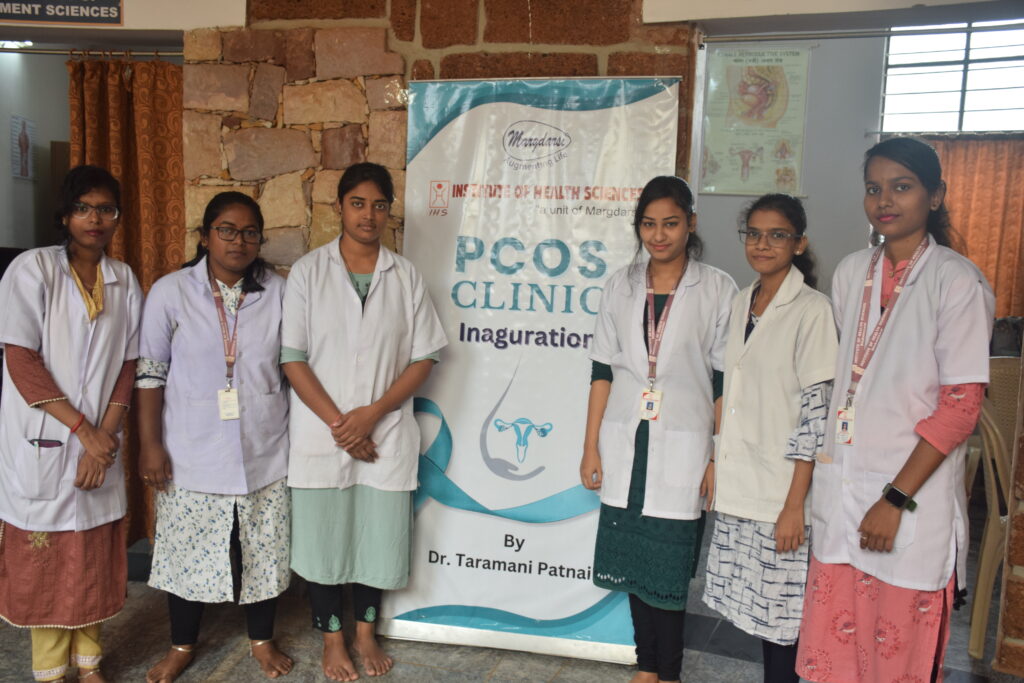
These supplementary courses empower students to stand out within their peer group.
This interdisciplinary MHA program equips graduates to become specialists across diverse domains of hospital functioning, fostering a capacity to manage healthcare facilities with exceptional competence.
As the realms of healthcare technologies and practices evolve in tandem with patient requirements, a new breed of hospital administrators is imperative to adeptly manage hospitals for optimum efficiency.
The recent Covid-19 pandemic further underscored the significance of hospital administrators in ensuring effective healthcare delivery during global health crises.
Healthcare administration master’s degree graduates are poised for a multitude of career pathways, spanning government and private hospitals, international entities such as UNICEF, UNDP, NGOs, and academic institutions.
This insitute is a unit of Margdarsi which is a best physiotherapy centre in bhubaneswar.
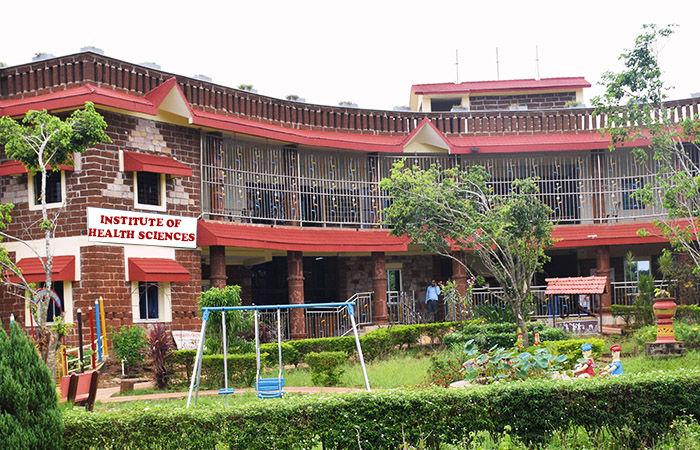
Their roles encompass healthcare administrators, hospital domain managers, hospital planners, hospital service evaluators, project managers, health insurance managers, quality assessors, and supply chain managers, among others.
Additionally, MHA graduates have the option to delve into advanced studies, specialized training, or pursue a PhD both in India and abroad.
In essence, the Master in Hospital Administration program from the Autonomous Institute of Health Sciences is a transformative journey, molding individuals into adept healthcare professionals equipped to lead, innovate, and contribute positively to the ever-evolving landscape of healthcare administration.

